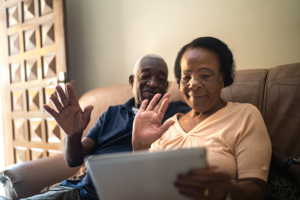Assessing the Mental Health of Seniors When You Live Far Away

Find helpful tips on assessing the mental health of seniors.
The fear and isolation as a result of have wreaked havoc on the wellbeing of older adults, with nearly one-half of seniors surveyed in a Kaiser Family Foundation stating that their level of stress and worry was negatively affecting their health. Even though it still may be risky to visit in person with senior loved ones, it is important to stay in regular and frequent contact and also to watch out for any changes or signs which might signify a mental health concern, such as depression. Assessing the mental health of seniors is possible, even from a distance.
As stated by psychiatrist Judith Feld, MD, MPH, “If a senior usually really enjoys a call with a grandchild, for example, but that seems to have changed, maybe you need to ask more questions, such as, ‘How can we be of help?’”
Other warning signs of depression to watch for include sleeping problems, reduced appetite, listlessness, and complaints about pain, which interestingly, is often one of the main symptoms of depression in older adults. Take note of anything that may seem abnormal for a senior’s personality and character.
It’s important to understand that depression is not simply an unavoidable aspect of growing older, and that it is a serious – but treatable – condition.
Here are a few additional ideas to help you with assessing the mental health of seniors:
- Keep the conversations organic and natural, without coming across as interrogating. Statements such as, “Tell me what’s been happening in your life this week,” will motivate a senior to open up significantly more than, “Tell me what the doctor said at your last scheduled appointment.” The goal is to be caring yet not condescending, being mindful never to attempt to parent your parents.
- While seeing and talking with the grandkids on Zoom is a good way to boost an older adult’s spirits, make sure to allow for some one-on-one time for you to talk without children present.
- Take notice of what’s going on in the background of your video chats for any additional clues, such as whether or not the home looks neat and well maintained, in addition to personal hygiene – unkempt, disheveled hair, as an example.
- Take into consideration whether substance abuse could be a factor. A rise in alcohol consumption during the pandemic is happening in people of all ages, and may be very harmful if there are potential interactions with medications the senior is taking.
If you suspect depression or any other mental health issues in an elderly parent, make sure to connect with the physician immediately. Since you are most familiar with the senior, you may well be able to pick up on signs that the medical team misses during routine appointments, and it’s imperative to make your concerns known.
If you have any concerns, contact Responsive Home Care for additional assistance. We can act as your eyes and ears when you’re unable to be there in person, and provide a wide selection of customized services to enhance socialization and quality of life at home. Contact us at (954) 486-6440 for more information and to learn more about respite care in Weston, FL and surrounding areas.

 In an ideal world, medical care would revolve around you and your own preferences, adhering to your particular needs and wishes – fitting into your schedule and routine, unhindered by problems such as an unwavering medical professional who views healthcare choices in black and white. Reality is far from perfect though, and the majority of us tend to submit to doctors’ orders without any concept that there might be a better-suited choice.
In an ideal world, medical care would revolve around you and your own preferences, adhering to your particular needs and wishes – fitting into your schedule and routine, unhindered by problems such as an unwavering medical professional who views healthcare choices in black and white. Reality is far from perfect though, and the majority of us tend to submit to doctors’ orders without any concept that there might be a better-suited choice.